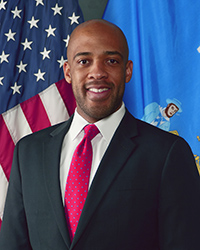February 21, 2022 — Wisconsin Lt. Gov. Mandela Barnes, chair of the Governor’s Task Force on Climate Change, will speak and answer questions from 3 to 4 p.m. on Monday, Feb. 28, at the University of Wisconsin-River Falls in the Kinnickinnic Theater, University Center.
 Barnes will talk about what students and community members can do about taking action on climate change solutions and discuss the Wisconsin Governor’s Task Force on Climate Change Report. The event is free and open to all. Due to COVID-19, masks are required in UWRF buildings.
Barnes will talk about what students and community members can do about taking action on climate change solutions and discuss the Wisconsin Governor’s Task Force on Climate Change Report. The event is free and open to all. Due to COVID-19, masks are required in UWRF buildings.
UWRF Chancellor Maria Gallo will introduce Barnes.
“I am thrilled Lt. Gov. Barnes is visiting the campus and sharing the message of sustainability and strategies to address the climate crisis,” Gallo said. “One of the themes of my Listening and Learning Report released in January was to embrace a holistic approach to sustainability. Students want UWRF to expand our commitment to sustainability, and it is a priority for us.”
The Governor’s Task Force on Climate Change Report was published in December 2021.
The report includes 55 climate solutions across nine sectors that will lay the foundation for the state to better adapt to and mitigate the effects of climate change, while also seeking environmental justice and economic opportunities in renewable energy and conservation.
Over the last year, the task force worked to identify strategies to combat climate change by studying recent science and data, learning from Native Nations, farmers, nonprofit organizations, businesses, and local governments that are already taking action to address the crisis, and, most importantly, listening to the experiences of Wisconsinites – particularly those of communities that have been excluded from policymaking in the past, according to a news release.
“The climate crisis is taking a toll on everyone in our state, but communities of color and low-income communities are more likely to face the harshest impacts of climate change, despite contributing the least to the problem,” Barnes stated in the news release. “In order to address this crisis and the environmental injustices associated with it, we must take urgent action, and we must ensure those actions are equitable and inclusive—anything less will continue the long pattern of environmental racism we have witnessed in this country.”
The solutions in the report range from the creation of a state office to address environmental injustices, green job training programs for displaced and marginalized workers, funding to help farmers adopt more sustainable practices, reimplementing transportation policies that promote clean, alternative methods of transportation, and statutory changes to help the energy sector transition to cleaner energy production.
“The people are ready for change,” Barnes stated in the climate report. “The people are demanding change. Farmers are choosing more sustainable agricultural practices. Utility companies are investing in renewable energy. And our local communities are reforming their policies to promote greener, cleaner economies. We can and must make Wisconsin a place where everyone can grow up in a safe and clean environment and has the opportunity to thrive, no matter their ZIP code.”
Barnes was elected lieutenant governor on Nov. 8, 2018. He is the first African American to serve in the position in Wisconsin, and the second African American to ever hold statewide office.
Born and raised in Milwaukee, Barnes is the son of a public school teacher and a manufacturing assembly line worker – both union members to whom he credits with shaping his worldview. A proud product of Milwaukee Public Schools, he graduated from John Marshall High School in 2003.
Barnes is a graduate of Alabama A&M University. After college, he worked for various political campaigns and in the city of Milwaukee mayor’s office, and then as an organizer for Milwaukee Inner-City Congregations Allied for Hope, a Milwaukee-based interfaith coalition that advocates for social justice.
In 2012, at the age of 25, Barnes was elected to the Wisconsin State Assembly where he served two terms. His time in the State Assembly included serving as chair of the legislature’s Black and Latino Caucus and becoming a recognized leader on progressive economic policies and gun violence prevention legislation.
The event is sponsored by the UWRF Sustainability Fellows and Center for Excellence in Teaching and Learning.
For more information on Barnes’ visit, contact Grace Coggio, Sustainability Fellow and associate professor of communication studies at grace.coggio@uwrf.edu or 715-425-4298.


